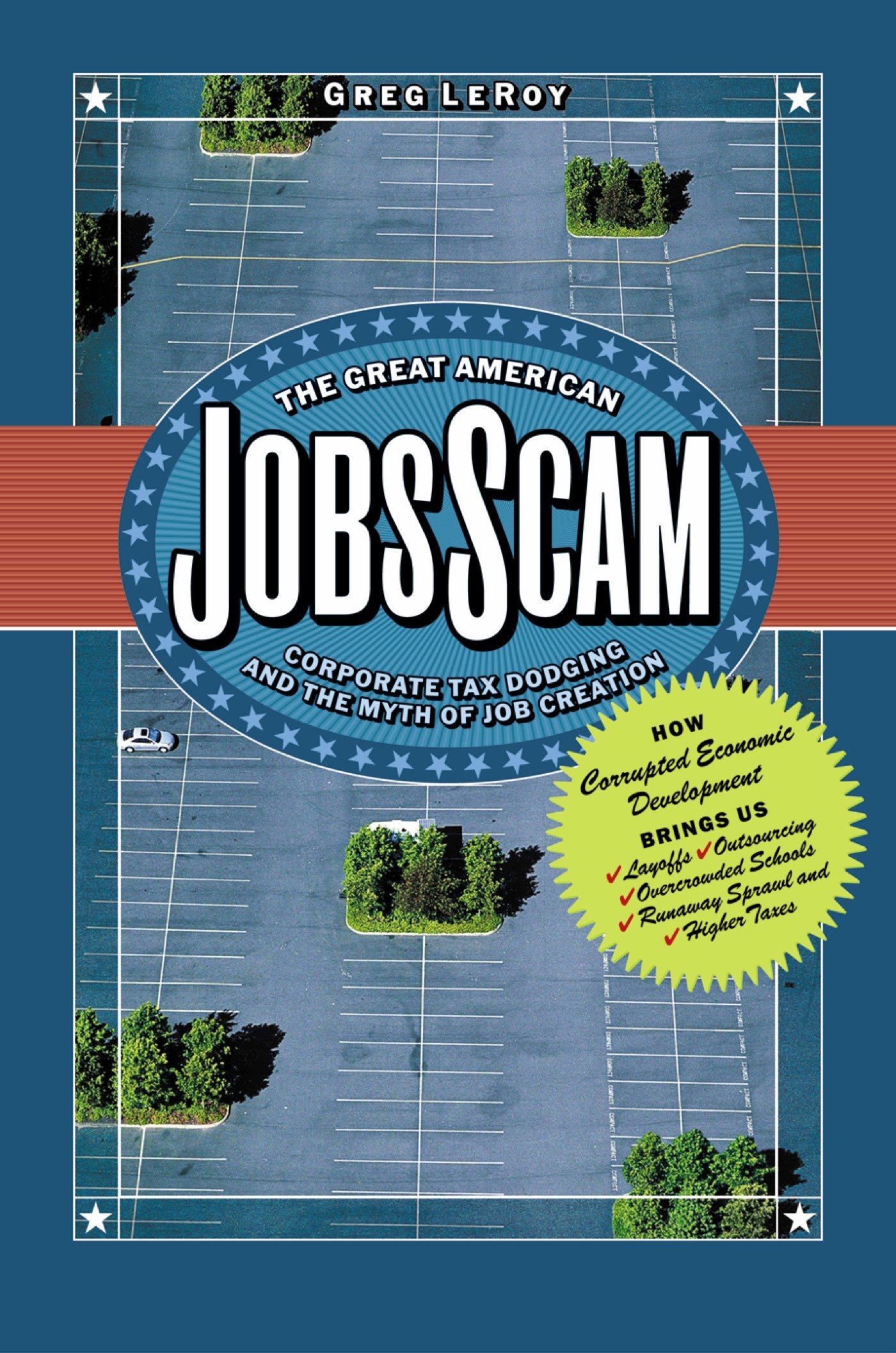The Great American Jobs Scam: Corporate Tax Dodging and the Myth of Job Creation
19.00 JOD
Please allow 2 – 5 weeks for delivery of this item
Description
What do Wal-Mart, Dell, Fidelity Investments, Boeing, and Cabela’s have in common? They’re all part of a $50 billion a year scam in which—in the name of “job creation”—corporations play states and cities against each other to win hefty taxpayer subsidies that routinely exceed $100,000 per job. But do they provide more jobs, higher wages, or improved living standards in exchange? Greg LeRoy exposes these deals for what they are—no-strings-attached free rides for corporations that rarely create any new jobs. In fact, after securing these packages, many companies lay people off, pay poverty wages, or even relocate to other states. This is the Great American Jobs Scam: a costly bait-and-switch that swindles communities in more ways than one. They lose jobs—or gain jobs so low-paying they do nothing to help the community—and they lose revenue through massive corporate tax breaks. That means fewer resources for maintaining schools, public services, and infrastructure. LeRoy exposes corporations’ careful orchestration of this scam, dissects government and corporate mumbo-jumbo with plain talk, and offers commonsense reforms that will give taxpayers powerful new tools to protect our communities.
Additional information
| Weight | 0.46 kg |
|---|---|
| Dimensions | 2.85 × 16.51 × 24.13 cm |
| PubliCanadation City/Country | USA |
| by | |
| Format | Hardback |
| Language | |
| Pages | 304 |
| Publisher | |
| Year Published | 2005-7-10 |
| Imprint | |
| ISBN 10 | 1576753158 |
| About The Author | Greg LeRoy has been dubbed “the leading national watchdog of state and local economic development subsidies” and “God’s witness to corporate welfare.” For more than 20 years, mostly from Chicago, he has been writing, consulting, and training for unions, community groups, environmental and smart growth advocates, labor-management committees, professional associations of development officials, elected officials, journalists, and state and local government agencies. His 1994 book, No More Candy Store: States and Cities Making Job Subsidies Accountable, was the first compilation of economic development safeguards such as clawbacks and job quality standards. Upon winning the Stern Family Fund’s 1998 Public Interest Pioneer Award, he founded Good Jobs First (http://www.goodjobsfirst.org). Based in Washington, DC, Good Jobs First promotes corporate and government accountability in economic development and smart growth for working families. It also includes Good Jobs New York, the Corporate Research Project, and Good Jobs Illinois. Greg holds degrees in journalism and U.S. history. |
“Greg LeRoy brings this arcane debate out of the shadows of economic theory by telling the stories of real businesses from across the United States. He draws on years of experience to suggest how subsidies can work better for American workers and for our communities.” —Congressman Earl Blumenauer, founder and co-chair, U.S. House of Representatives Livable Communities Task Force “The Great American Jobs Scam is one-stop shopping for every citizen who wants to understand why and how corporate welfare doesn’t work. And when Greg LeRoy describes how Wal-Mart got over $1 billion in taxpayer deals at only 244 of its facilities as ‘the tip of the iceberg,’ he’s inviting all of us to discover the rest of the iceberg—and melt it.” —Joe Trippi, author of The Revolution Will Not Be Televised: Democracy, the Internet, and the Overthrow of Everything “Greg LeRoy not only tells us what’s wrong with job subsidies—he shows us what we can do about it, so we can get our priorities straight and our democracy back.” —Si Kahn, coauthor of The Fox in the Henhouse: How Privatization Threatens Democracy, and Executive Director, Grassroots Leadership “LeRoy does a wonderful job of pulling back the curtain and revealing the truth behind the broken promises of great riches that are sold to com- munities and taxpayers across America. Perhaps most valuable are his clear suggestions and solutions—absolutely critical tools for the policymaker or citizen activist.” —Chellie Pingree, President and CEO, Common Cause, and former Majority Leader, Maine State Senate “LeRoy has written an important book on an issue that is of vital concern to working Americans.” —John Sweeney, President, AFL-CIO “Americans know the economy is not working, but most don’t know why. This book outlines the problems, proposes concrete solutions, and offers strategies for moving forward toward policies that create and support family-wage jobs. A must-read for all of us.” —Kim Bobo, Executive Director, Interfaith Worker Justice, and author of Organizing for Social Change “This book fills a pressing national need for a comprehensive analysis and criticism of the economic ‘incentives,’ or should we say ‘subsidy,’ issue afflicting the United States. Taxpayers—particularly small and middle-sized businesses—should be outraged.” —Robert F. Orr, Executive Director, North Carolina Institute for Constitutional Law, and retired Justice, North Carolina Supreme Court “Finally, a book that will propel policymakers to end the hemorrhaging of public treasuries from bidding wars. LeRoy exposes the disjuncture between the rhetoric of job creation and the reality of huge subsidies for paltry numbers of jobs, often fleeting and usually underpaid. He doesn’t just leave us shaking our heads—he offers us a full course menu of smart and doable remedies.” —Professor Ann Markusen, University of Minnesota and author of Second Tier Cities “The Great American Jobs Scam offers a lively chronicle of the exploits of corporate mercenaries who have mastered the art of bait-and-switch in the name of job creation and economic development. LeRoy shows us how our communities can battle back to achieve the good life for families and more livable communities.” —Don Chen, Executive Director, Smart Growth America “By showing how the tax-dodging system works, [this] book will empower taxpayers to hold their elected officials (and the corporate special interests) accountable. It should be required reading for governors, mayors and legislators around the country who want to invest their citizens’ money wisely and effectively.” —Robert S. McIntyre, Citizens for Tax Justice “Anyone concerned about sustainable economic development, decent schools, urban sprawl, or their children’s future should read this book.” —Mike Matejka, Alderman, City of Bloomington, Illinois “SEIU enthusiastically supports Greg LeRoy’s new book . . . No one has helped the labor movement more than Greg LeRoy to learn how to investigate these subsidies and leverage them for working families.” —Andrew L. Stern, Service Employees International Union “I like Greg’s stuff immensely; he cuts through the jargon with incredible skill, presents the issues, brings them alive.” —Professor William W. Goldsmith, Chairman, Department of City and Regional Planning, Cornell University |
|
| Table Of Content | Foreword Introduction: Money for Nothing One: The Tax Dodgers Are Coming! The Tax Dodgers Are Coming! Two: Site Location 101: How Companies Decide Where to Expand or Relocate Three: Fantus and the Rise of the Economic War Among the States Four: “Single Sales Factor” and the Corporate Assault on the Income Tax Five: Property Tax Abatements and Your Local School Six: Subsidizing Sprawl, Subsidizing Wal-Mart Seven: Loot, Loot, Loot for the Home Team Eight: Shifting the Burden Nine: Building a New Consensus for Reform Acknowledgments Notes Index About the Author |
| Excerpt From Book | Money for Nothing Lurking within the records of most cities and states in America there lies a scandal. A tax scandal. A jobs scandal. A corporate and political scandal. Look up the names of corporations that have received taxpayer subsidies in the name of jobs. Almost every big company has gotten them. In fact, the average state now has more than thirty economic development subsidies, many of which are locally granted by cities and counties. These subsidies include property tax abatements, corporate income tax credits, sales and excise tax exemptions, tax increment financing, low-interest loans and loan guarantees, free land and land write-downs, training grants, infrastructure aid—and just plain cash grants. Chances are you will find companies—many companies—that have failed to create or retain as many jobs as they said they would. Companies that are paying poverty wages or failing to provide healthcare to their employees. Companies that are abandoning our cities and sprawling onto farmland and natural spaces. Even companies that are outsourcing jobs offshore. Dig a little deeper and you’ll undoubtedly find companies that have not created any new jobs—even some that have actually laid people off since they got the subsidies. Other companies that have gotten paid just to move existing jobs from one place to another, where they are proclaimed to be “new jobs.”2 How can companies get away with this? Because the system is rigged. Corporations have it down to a science. They have learned how to chant “jobs, jobs, jobs” to win huge corporate tax breaks—and still do whatever they wanted to all along. That’s the Great American Jobs Scam: an intentionally constructed system that enables corporations to exact huge taxpayer subsidies by promising quality jobs—and then lets them fail to deliver. The other benefit often promised—higher tax revenues—often proves false or exaggerated as well. This system costs taxpayers an estimated $50 billion a year in total spending by states and cities.1 The bottom of the iceberg—in every sense of the word—is the tax breaks. Those granted by states—income, sales, and excise taxes—are the least visible, least accountable, and most corrosive means by which states fund job creation. Those granted locally—in particular, property tax abatements and diversions—are especially harmful to schools. This system has a long history and many moving parts. It can be traced at least as far back as the Great Depression, but it really matured by the 1970s. By then, most of the key actors were in place: secretive site location consultants who specialize in playing states and cities against each other; “business climate” experts, with their highly politicized interpretations of tax and jobs data; and an organized corporate network orchestrating attacks on state tax systems. Today, this $50 billion-a-year pot has attracted an even more elaborate cast of characters: rented consultants proffering rosy projections about job creation and tax revenue; subsidy-tracking consultants to help companies avoid leaving money on the table; and even an embryonic industry that’s helping businesses buy and sell economic development tax credits. Perhaps we could overlook all this chicanery if the rising tide of money were lifting all the boats. But in return for all our taxpayer dollars we are not getting higher wages, better benefits, a stronger tax base, or better public services. Instead, for the last quarter century, most workers’ wages have stagnated or fallen, healthcare has become less affordable and available, and pensions have shrunk in number and value. States and cities have developed structural budget deficits, forcing cutbacks in everything from school programs to infrastructure maintenance.3 The only clear winners are large corporations. In return for building new facilities in many states, companies are actually getting negative income taxes. Subsidy packages routinely exceed $100,000 per job. Guess who’s getting stuck with the tab. When the big boys pay less, either the rest of us pay more or the quality of our public services declines—and usually it’s some of both. At the core of this scandal are corrupted definitions of “competition” that obscure cause and effect. We must create no-tax zones for factories, say the governors, to be competitive with other states—even though the whole country is bleeding manufacturing jobs and the obvious issue is globalization. We have to create a new TIF district (that’s “tax increment financing”) and steal shoppers from neighboring suburbs, say the mayors, to compete for tax base—even though malls in older areas are dying. Those who peddle and those who buy into these corrupted definitions salute the corporate bottom line while thumbing their noses at common sense, social science, and good government. These corruptions are the deliberate creations of a 50-year campaign by corporations to divide and conquer the states—as well as the suburbs. This corporate gospel of competition preaches that governments at all levels must not be allowed to cooperate with each other. Public relations campaigns, consulting studies, lobbying of federal and state legislators, litigation all the way to the Supreme Court—companies will do whatever it takes, but governments must not be allowed to work together against the corporate assault. They must be kept in the dark and allowed into the room only when it’s time to talk about subsidies.4 To that end, according to the gospel, states must not be allowed to compare notes to determine whether companies are lying about competing subsidy bids or cheating on their income taxes. Instead, states must only be allowed to compete to see which will tax the least corporate income, or which will give the biggest tax gift to a trophy deal. Cities and suburbs must not be allowed to cooperate either, even though their fates hinge upon the health of their regional economies, not upon individual deals. Instead, localities must compete for tax base by pirating jobs and retail sales from each other, even though this means chewing up farmland for wasteful sprawl and throwing away older areas, poor people, and past infrastructure investments. As public officials internalize these corrupted definitions, governments deliberately fail to cooperate with each other in the taxpayers’ interest. Business becomes the alpha constituent. In these “public-private partnerships,” government gets to play a single role: the dispenser of dollars. Blindfolded public officials practice job creation guided by wolves posing as Seeing Eye dogs. At every level, this system demeans and degrades public officials: the economic development official forced to bid for an unknown company against unknown competing sites; the school board members who have no say in the property tax abatements that will corrode their budget; the revenue director whose sober advice is upstaged by the frothy projections of an economist rented by the Chamber of Commerce; the governor who overspends on a “trophy” project because she so fears being known as “the governor who lost us Mercedes-Benz.” Those who would dare to ask an impertinent question are quickly singled out for ridicule and isolation: they must be against jobs. Besides creating corporate windfalls, the Great American Jobs Scam is causing all manner of collateral damage. It was used to blunt calls for trade reform long before NAFTA. It bankrolls the pirating of one state’s jobs by another state. It corrodes state budgets. It subsidizes private for-profit prisons—and hundreds of Wal-Mart facilities. The Great American Jobs Scam is used to help bust unions. It subsidizes poverty-wage companies that saddle us with hidden taxpayer costs such as Medicaid and Children’s Health Insurance Program bills. It is helping create a massive tax-burden shift away from big companies onto working families and small businesses. It is diverting precious resources away from the two investments that really do grow good jobs—skills and infrastructure. And just don’t get me started about stadiums.5 The scam has also created mass confusion about true cause and effect—about how little difference tax cuts and subsidies really make when it comes to jobs. The prevailing “business climate” ideology that plagues us today is a hangover from the meanest elements of the Old Economy. Our beliefs about taxes and jobs were shaped by a very politicized series of studies in the 1970s and 1980s that served the lobbying agenda of footloose manufacturers looking for cheap labor in the South on their way to Mexico or China. That agenda had no value for the rest of the economy then, and it is just what we don’t need to succeed in the New Economy today. Much of our prevailing ideology about jobs and land is a hangover from a manufacturing site location bias against cities and from a post-war consensus built around “white flight” from cities, concentrated poverty among people of color in older areas, and lots of subsidies for jobs out by the interstate—be they factory, office park, or Wal-Mart jobs. That consensus has left us with a sprawling, dysfunctional built environment that is harming our health and our economic competitiveness. That the scam could get this far out of hand suggests a profound breakdown in whatever consensus we ever had about corporate responsibility to our society. The way you handle your money is your value system. By their rampant tax dodging, large corporations are collectively saying: We don’t care if the schools fall apart and the bridges are crumbling and the public health systems are impoverished and college is becoming unaffordable. We are not all in this together. We are not investing in our communities’ futures. We are disinvesting.6 The Great American Jobs Scam belongs in the dustbin of history To put it there, we need strict accountability measures that will curtail private disinvestment and restore public reinvestment. By getting our taxpayer dollars out of private deals and into public goods, and by integrating our jobs strategy with land-use planning, we can spend less and get more. We must eradicate the subsidy scams that have grown up around the corrupted definition of competition and replace them with a healthy new form of competition in which places compete based on their assets—their skilled labor base, their infrastructure, their schools and universities, their entrepreneurial culture, their quality of life—which are made equally available to all employers. Fortunately, despite the siege of disinformation, there is a rich bipartisan history of reform that has created proven precedents for dismantling the scam. The most important of these is disclosure. When more information is available about the costs and benefits of the scam, many more people will get involved—and that’s the scammers’ darkest nightmare. Getting a lot more people involved is the only way to challenge the prevailing ideology. You can see that ideology for yourself by going to any conference of economic development professionals and watching the public officials. You will never hear them crow about how well their working families are doing, about rising median incomes or declining dependency on Medicaid or fewer children suffering from asthma. But you will hear them touting big deals. And you will see them courting site location consultants and corporate vice presidents. This is what economic development in the United States has become. Welcome to the Great American Jobs Scam. |
Only logged in customers who have purchased this product may leave a review.






Reviews
There are no reviews yet.